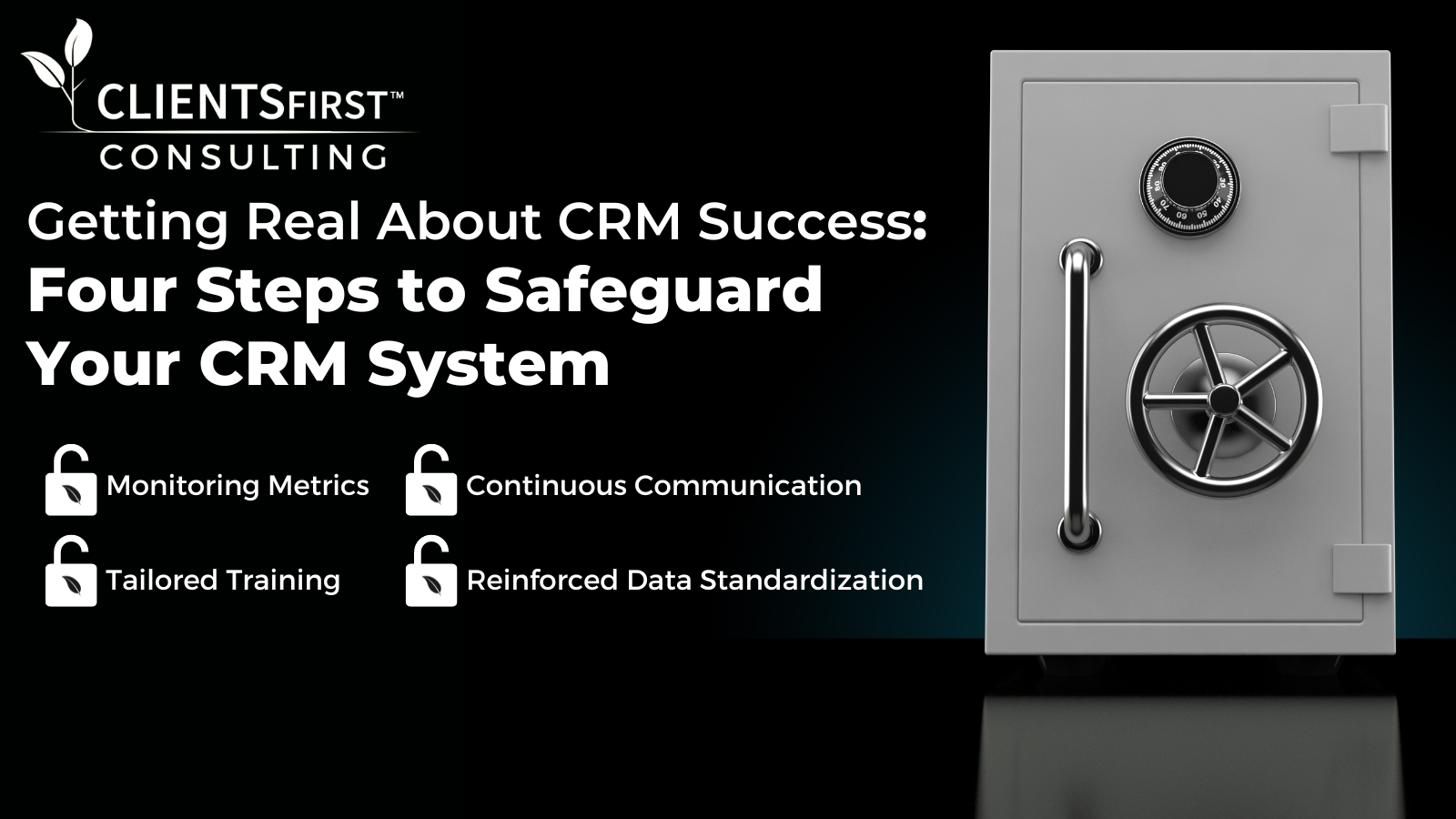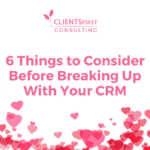Getting Real About CRM Success: Four Steps to Safeguard Your CRM System

Implementing a CRM system in a law firm is a tumultuous process that is filled with many challenges and milestones. After the initial stages of the rollout are completed – assessing the firm’s needs, selecting the right system, and developing a strategy – it is easy to think that the heavy lifting is behind you. However, the journey towards CRM success doesn’t stop there.
Ensure Long-Term CRM Success: Safeguard Your CRM System
Now comes the crucial stage of ensuring your CRM delivers sustained value and delivers on the promises made to firm leadership. To ensure long-term success it’s essential to take certain precautions and follow various procedures to safeguard your CRM system and the precious data it holds. Here are four steps to turn your CRM into a powerhouse for your law firm:
1. Monitor Metrics
A CRM is an investment, and like any investment, it needs performance tracking. For law firms, understanding which metrics need to be, and should be, tracked can be the difference between a successful implementation and a failed CRM. Start by identifying key performance indicators that align with your firm’s CRM strategy and objectives. Some common metrics we see firms track are:
- User Adoption Rates: Measures the number of users within the firm actively using the system. Essential for assessing how well the system was configured to the end-user’s needs.
- Lead Conversion Rate: Measures the number of prospective contacts that convert into paying clients. Can be used to assess the effectiveness of lead conversion strategies and business development pipeline configuration.
- Client Retention Rate: Measures the percentage of clients that continue to engage with the firm over a specific period. This measures the firm’s ability to build strong relationships and can be tied to how much end-users are utilizing the CRM system.
Once you have selected the metrics that best reflect the system’s performance, you can use them to identify areas for improvement. Is one marketing channel generating more marketing-qualified leads than another? Does a certain practice area generate a higher client retention rate? By monitoring and regularly reporting on these metrics, you can demonstrate the value of the system while optimizing and refining your marketing efforts.
2. Tailored Training
Each department at your firm will utilize different capabilities of the CRM system that are specific to their needs and requirements. To maximize the value gained from the system, training must be tailored to each user group. Utilizing a tailored approach to training will not only improve adoption rates but also ensure the CRM system aligns with the firm’s overall objectives and operational requirements.
The marketing department may utilize the system to track marketing campaigns or create segmented lists for targeted outreach; while attorneys will use the system to track billable hours or to access case-related documentation. The marketing team should be trained on campaign management and lead tracking while attorney training will emphasize case management and other features relevant to their needs.
It is also recommended that your firm has training videos readily accessible for new hires or laterals who need to be quickly trained on the system’s functionality. These may cover departmental use scenarios, data entry best practices, or user manuals for quick reference.
3. Continuous Communication
After a CRM is implemented and operational, there can be a lot of excitement surrounding the new tool. To maintain this momentum, it is essential to develop a communication strategy centered around system utilization and best practices. Regularly update users on new features, data enhancements, and even success stories. Generating and distributing reports on various metrics – such as key relationship reports or new client matter reports – is also essential for any communication strategy.
When communicating, be sure to maintain a two-way street. Encourage feedback from your end users and incorporate their suggestions in future system upgrades to enhance usability. By embracing user input as a catalyst for improvement, firms can safeguard their CRM system and ensure that it remains a valuable asset that drives success across the organization.
4. Reinforce Data Standardization
Your CRM system is only as good as the data it houses, and according to various research organizations, up to 70% of your data can go bad each year and 91% of data records are incomplete. These statistics underscore the importance of regularly scheduled reviews to not only assess system performance but to ensure that your data is accurate, consistent and standardized. To achieve and maintain data quality, firms should create and distribute data standardization guides that ensure uniformity across data fields, and minimize errors and discrepancies.
To further safeguard your CRM system from data quality issues, firms can integrate automated data cleansing tools with their CRM. Advanced tools like artificial intelligence or ERM can identify and rectify inconsistencies, duplicates and other inaccuracies in the data. These tools streamline data management processes and alleviate end users from the monotonous task of updating contacts record by record, allowing them to focus on more strategic projects.
Safeguarding your CRM system requires proactive measures beyond the initial stages of implementation. By defining, measuring and reporting on key metrics, establishing a broad training and communication strategy, and regularly reviewing the system capabilities and data quality, law firms can maximize the value gained from their CRM investment. Remember, CRM success is not a destination, it is an ongoing journey and commitment to leveraging technology for strategic advantage and client-centric growth.
By embracing these steps, you can position your firm for continued success in managing and growing client relationships and enable your firm to stay competitive in the ever-evolving legal landscape.
For almost 20 years, the team at CLIENTSFirst Consulting has been helping professional services firms and other organizations achieve CRM Success, improve Data Quality and successfully select and implement Marketing Technology systems to maximize value, adoption and return on investment. If you need help with CRM Success, please contact us at 404-249-9914 or Info@ClientsFirstConsulting.com.






